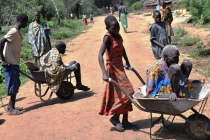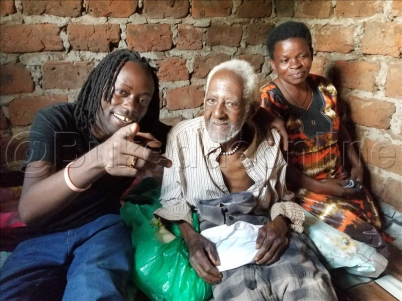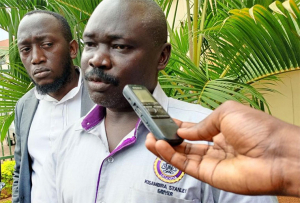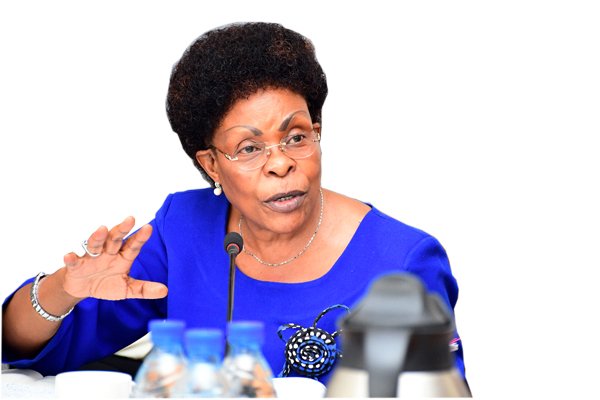Stanley Kisambira (R) talking to the media
Judiciary driver Stanley Kisambira whose audio clips in which he threatened to commit murder-suicide so as to kill a judge and his bodyguard has responded to the permanent secretary who gave him only five days to defend himself.
In a defense written by his lawyers from the Centre for Legal Aid, Kisambira says he doesn't regret his statements and has asked the judiciary PS Dr Pius Bigirimana to cease from further absurdity.
Kisambira, a driver of Mbale High court judge Godfrey Namundi can be heard in the audio clips complaining about salary disparities in the judiciary for drivers and expressing his dissatisfaction with earning Shs 200,000 since joining the justice system in 2008.
In the same clip, Kisambira is heard saying he is very annoyed, disgusted and can even ram into a stationary vehicle and kill a principal, bodyguard, and himself - three people at once which is more painful compared to a bodyguard who only kills one principal. This was in reference to the recent murder of the state minister of Labour, Employment and Industrial Relations by his own bodyguard Wilson Sabiiti.
In a May 16 letter, Bigirimana accused Kisambira of misconduct, saying he would have used the right means as provided for under the public service standing orders as a public servant, other than running to social media to address his grievances.
"Inciting violence and threatening to intentionally cause an accident is unprofessional, criminal and punishable in the strongest terms. In addition, uttering false information that you are only paid Shs 200,000 contravenes section F-r of the public service standing orders."
As such, Bigirimana asked Kisambira in the letter to explain his act of gross misconduct within five days of receipt of this letter. Failure to do this, Bigirimana threatened to subject Kisambira to disciplinary measures including dismissal from the judiciary.
But in response, Kisambira's lawyers say that it was premature for Bigirimana who is also the judiciary's accounting officer to convict him of gross misconduct.
"Further to yours HC/P 10701 dated 16 May 2023, prematurely convicting our client of gross misconduct” and threatening to subject him to “further disciplinary measures including dismissal from the judiciary service,” we are instructed to reply as follows," reads the one-paged letter response.
The letter adds: "With great respect, your indecorously worded missive was not only premature and misconceived, but has also brought the judiciary service into disrepute."
According to Kisambira's lawyers, their client accepts no liability whatsoever for the contents or circulation of the audio clip at issue.
"A private communication, it contains protected political opinion and does not reasonably imply what you allege (incitement to violence, threatening accidents, uttering false information, etc).... as you rightly stated, our client did the right thing to express his dissatisfaction." reads the letter.
According to the Centre for Legal Aid, Bigirimana's reference to section p–b of the Uganda Public Service Standing Orders 2021 which talks about the procedure for conducting government, is plainly disingenuous and hereby "denounced, with contempt".
"You stretched the interpretation of that section by falsely implying that the alleged audio clip was an “official correspondence…which came into the possession of our client in the course of his official duties...Please cease and desist from further absurdity," advises the letter.
The lawyers further indicate that Kisambira enjoys what they have described as absolute immunity under the law to freely express his dissatisfaction in a peaceful manner, without fear of retaliation or victimization by his employer or the state.
"Take further notice that pursuant to sections 6(1) and 75(g) of the Employment Act 2006, you are barred from targeting an employee's political opinion as the reason for dismissal or imposition of a disciplinary penalty," adds the response.
To support their response, the lawyers have quoted several laws that they say Bigirimana as accounting officer of the judiciary should have looked upon before writing to Kisambira. They say the public service regulations on code of conduct further bars him from implementing any disciplinary procedure before the completion of proper investigations.
Accordingly, they have asked Bigirimana to terminate what they have described as a travesty of justice, and immediately provide Kisambira a decent package of appropriate interventions to address his dissatisfaction.
Following the audios by Kisambira, he was arrested and detained at Kampala Central police station for two days but he was later released on police bond.
Sources in police said that he had to be released because it was not right in their view to take him to court simply because he had talked about his grievances and that the best solution is for the judiciary to review his salary.
On social media platforms, Kisambira has been hailed as brave for exposing the low salaries of judiciary rank-and-file members. A fundraising campaign has been initiated to support Kisambira in obtaining legal representation and welfare.
The campaign encourages donations, emphasizing Kisambira's role as a whistleblower who spoke out about the exploitation of the judiciary. The flyer states, "Kisambira is ready to be punished or sacked but won't be silenced."
Nb
It is a very good debate that is going on especially for the workers' pay in this country just after the recent celebration of the International Workers' Day on 1st May, 2023.
Apart from that African politics of Uganda National Resistance Movement, the workers day celebrations were about a living wage.
The Union members and their struggles all over the world have their International Workers Movement. Eight-hour day movement that advocated 8 hours work for any worker. 8 hours recreation. And 8 hours rest.
One cannot see any wrong with this worker discussing about his small wages as compared to the wages of some of the African workers who are very rich multi-millionaires in this country!






 The poor African man with a walking stick
The poor African man with a walking stick

























Make A Comment
Comments (0)